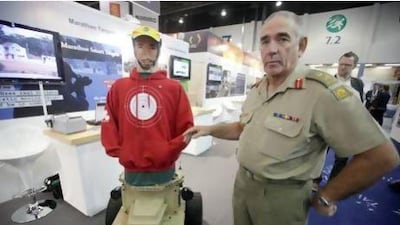ABU DHABI // A one-of-a-kind security and controls system has been installed at Khalifa Port, as part of a contract worth more than Dh400million.
The bespoke system is now 97 per cent complete, according to General Dynamics UK (GDUK), which delivered the project, with only training of essential staff remaining.
GDUK, which is exhibiting at Idex this week, has been involved on the Khalifa Port project since 2008 and was awarded the contract in 2010 after a year-long tender process.
The port, which was inaugurated in December last year, is expected to be able to handle 37 million tonnes of cargo and five million containers each year by 2030.
It forms part of larger-scale plans for the Khalifa Industrial Zone Abu Dhabi (Kizad) that, upon completion, is expected to span an area of 417 square kilometres on a series of man-made islands.
It is estimated that well over Dh26.6billion will be spent on the first phase of Kizad alone.
Pasquale Andolfo, project director at GDUK, said the scale the of project was something they had never dealt with before: "The number of stakeholders involved was a challenge; we need to think about Abu Dhabi Police, customs and a number of government agencies - they all have their own requirements to be considered."
GDUK has installed a dedicated wireless network, which is not the usual Wi-Fi that we see in our homes but is specifically designed for this type of environment.
The system protects the essential operating elements of the port's electronics, safeguarding against possible failure and aims to minimise human error or tampering.
To share information between ships and onshore operations, as well as interface with local authorities, the company has installed a unique Port Operating System.
There are two control centres that will have access to all systems and they can control, monitor and react to a specific event during the running of day-to-day operations.
"Security was one of the major elements to our project, given the regulations in place for international ports," Mr Andolfo added.
A key component of the Khalifa Port project is to ensure it is fully in line with the International Ship and Port Facility Security Code (ISPS) that ensures measures are put in place to protect vessels and their crews from threats.
It was established following the September 11, 2001, terror attacks in the United States to assess the potential risk faced by ships passing through international waters, and to ensure adequate security measures are in place.
Mr Andolfo said their systems had to fall in line with this goal. "This is one of the first local ports to ever be designed from scratch to be ISPS-compliant," he said. "Across the world, most have had to be revamped or adapted to meet these requirements. This is not the case with Khalifa Port."
The involvement of Emiratis was a key factor in the successful delivery of GDUK's systems, according to Mr Andolfo.
"At the peak of our work, we had over 700 people on site, comprising 350 of our employees and then the remaining were all from UAE-based subcontractors," he said.
Mark Douglas, vice president of GDUK, said: "It's been a huge and complex project for us.
"We are delighted to be involved with the Abu Dhabi port, and hope to maintain our work with them. We hope that we can continue our presence here and meet any future needs of the Khalifa Industrial Zone."
Mr Douglas also hinted that, in the coming months, a lucrative new partnership could be established between GDUK and an as-yet-unnamed UAE private-sector body.

